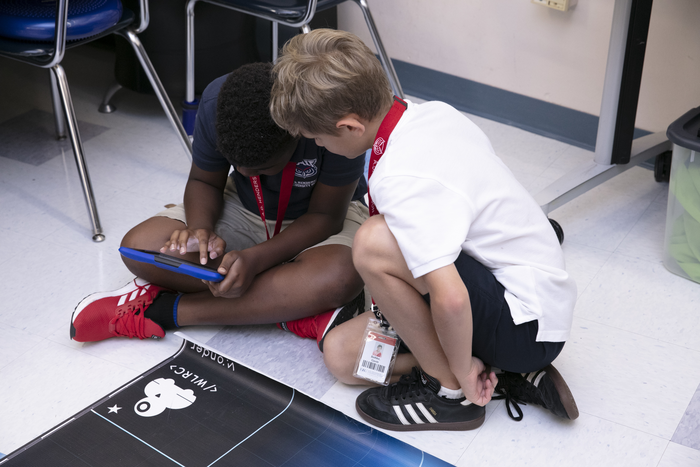Bullying has been made easier and sometimes more serious by social media, gaming platforms, and other online communications technologies, affecting so many of our schools, families and communities. Research is also clear that cyberbullying – the online variant of school-based bullying – is linked to a host of negative emotional, psychological, physiological and behavioral outcomes.

Credit: Florida Atlantic University
Bullying has been made easier and sometimes more serious by social media, gaming platforms, and other online communications technologies, affecting so many of our schools, families and communities. Research is also clear that cyberbullying – the online variant of school-based bullying – is linked to a host of negative emotional, psychological, physiological and behavioral outcomes.
While the topic has received widespread attention in the last decade, little is known about its relationship with empathy. Even less is known about how empathy is related to bias-based cyberbullying: harm and abuse toward others because of one’s identity (e.g., race/ethnicity, gender or religion) – a phenomenon of increasing concern against the backdrop of rising hate speech and hate crimes across the nation.
A first-of-its-kind study led by Florida Atlantic University in collaboration with the University of Wisconsin-Eau Claire, explored the relationship between empathy and cyberbullying among early U.S. adolescents. Researchers were particularly interested in two types of empathy – affective and cognitive – and how they differed in children who cyberbullied. Affective empathy is generally automatic and an unconscious reaction where the feelings of another are felt and shared, while cognitive empathy involves an intentional placing of oneself in the position of another to identify their mental state and understand their emotions.
For the study, researchers used a national sample of 1,644 12 to 15 year olds and examined general cyberbullying, race-based cyberbullying, and religion-based cyberbullying. Results, published in the Journal of Early Adolescence, showed that those higher in empathy were significantly less likely to cyberbully others in general, and cyberbully others based on their race or religion. The higher a youth scored on empathy, the lower the likelihood that the youth cyberbullied others. When it came to bias-based cyberbullying, higher levels of total empathy were associated with lower odds of cyberbullying others based on their race or religion.
When the two sub-facets of empathy were considered separately, only cognitive empathy was significantly and inversely related to cyberbullying. Surprisingly, affective empathy was not. This finding was unexpected because research has consistently shown a negative association between affective empathy and a variety of bullying behaviors.
“Based on our findings, we believe that schools need more focused efforts to improve empathy as a means to reduce these forms of harm and better protect those in vulnerable and marginalized communities,” said Sameer Hinduja, Ph.D., lead author, professor, FAU School of Criminology and Criminal Justice within the College of Social Work and Criminal Justice, co-director of the Cyberbullying Research Center, and a faculty associate at the Berkman Klein Center at Harvard University. “However, anti-bullying programs need specific direction as to what type(s) of empathy should be prioritized.”
Cognitive empathy and not affective empathy has been found to be associated with sensitivity to injustice, which inhibits harm toward others and compels positive, intervening action when witnessing victimization online (or offline). Moreover, cognitive empathy is interconnected with “social empathy” and understanding another person’s emotions.
“For decades, research has shown that those who are different than the prevailing majority are not disproportionately targeted, but suffer more severe consequences when victimized. As such, we must continue to identify what can stem the tide of this trend,” said Hinduja. “Our study suggests that cultivating and enhancing cognitive empathy in young persons should not only reduce participation in race- and religion-based cyberbullying, but other forms of bias-based cyberbullying such as those tied to one’s sexual orientation, gender identity or disability.”
Study co-author is Justin W. Patchin, Ph.D., professor of criminal justice, Department of Political Science, University of Wisconsin-Eau Claire and co-director of the Cyberbullying Research Center.
– FAU –
About Florida Atlantic University:
Florida Atlantic University, established in 1961, officially opened its doors in 1964 as the fifth public university in Florida. Today, the University serves more than 30,000 undergraduate and graduate students across six campuses located along the southeast Florida coast. In recent years, the University has doubled its research expenditures and outpaced its peers in student achievement rates. Through the coexistence of access and excellence, FAU embodies an innovative model where traditional achievement gaps vanish. FAU is designated a Hispanic-serving institution, ranked as a top public university by U.S. News & World Report and a High Research Activity institution by the Carnegie Foundation for the Advancement of Teaching. For more information, visit www.fau.edu.
Journal
The Journal of Early Adolescence
DOI
10.1177/02724316221088757
Method of Research
Meta-analysis
Subject of Research
People
Article Title
Bias-Based Cyberbullying Among Early Adolescents: Associations With Cognitive and Affective Empathy
Article Publication Date
29-May-2022




